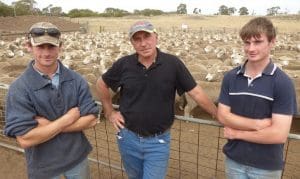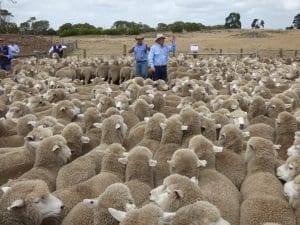
Peter Rentsch, centre, with sons Lachlan, on the left, and William.
COMMERCIAL Corriedale ewes sold for what is believed to be an Australian record price of $252 at the Cheviot Hills flock sale at Penshurst last week.
Breeder Tim Hutton said the prices paid for his pure Corriedale flock on February 16 were “unbelievable” and above expectations.
“It would have to be an Australian record for Corriedales.”
Selling agent Kerr & Co Livestock offered about 3600 Corriedale ewes and ewe lambs, realising up to $252 for 578 2.5 year-old October shorn Corriedale ewes joined to Cheviot Hills Corriedale rams. The joined 1.5 year-old Corriedale ewes sold for $248 and young Borderdale ewes made to $252.
However, Mr Hutton was disappointed many of his Corriedale ewes, although joined to Corriedale rams for a May lamb this year, would not be bred to Corriedale rams in the future.
Ewe buyers were being short-sighted by not including a maternal ewe production component in their flocks, he said. The Cheviot Hills Corriedale flock has been mostly joined to Corriedale rams, with some going to Border Leicester rams to produce a Borderdale ewe for prime lamb production.
“The issue is where are these fat lamb boys going to go for their ewes in the future? Mr Hutton asked.
“They are going to composites, but they still have to be shorn and the wool is worth nothing, in fact they will be burying it, I reckon, in the long run.
“Whereas the Corriedale, with its wool and frame, you can put a Border Leicester over them and get a Borderdale, a brilliant ewe, rather than putting a straight Poll Dorset over them,” he said.
Click here to get the latest Sheep Central story links sent to your email inbox.
$252 price tag is among highest recent Corriedale prices
Australian Corriedale Association president Graham Jenke said the $248-$252 price tags were some of the highest prices paid for Corriedales recently, but he did not know if it was a record.
He said most Corriedale ewes didn’t come onto the public auction market, with breeders selling privately direct to regular repeat buyers.
“We are getting demand for them at the moment, but we haven’t had any to sell.
“It has gone to the situation now where people are buying Corriedale rams and crossing them over Merino ewes and over first cross ewes to get better wool quality and constitution,” he said.
“Every year I have half a dozen enquiries for ewes and most times are can’t supply them.”
Many Corriedale breeders were now also breeding finer wool onto their sheep to suit market demand, he said.
Prime lamb producers being ‘short-sighted’
Mr Hutton believed prime lamb producers were being short-sighted by not maintaining a maternal self-replacing component in their flocks.
“We cut just under 7 kilograms of wool off all adult sheep last year, including the (208) rams, plus the stud sheep.”
For the past decade Mr Hutton has joined a component of his Corriedale ewe flock – about 500 of 2000 Corriedale ewes — to Border Leicester rams to produce Borderdale ewes, which were joined to Poll Dorset rams for prime lamb production in a self-contained lamb-wool operation.
Mr Hutton said pure Corriedale breeders had to “mix it” with prime lamb mother buyers at his sale, “because they are running out of good breeding ewes.”
The Cheviot Hills Corriedale stud has been maintained by Mr Hutton for sale.
“I don’t want to see it dispersed; I will sell it to someone who is a true Corriedale breeder and wants to keep it going, because I think eventually they will come back around, with the declining sheep numbers.”
Rentsch family bought ewes for prime lamb production
The Rentsch family at Penshurst paid an average of about $238 for 1661 ewes at the Cheviot Hill sale to boost their ewe numbers after purchasing a neighbouring property. The family bought the 708 1.5 year-old ewes for $248, the 578 2.5 year-olds for $252 and 375 4.5 year-olds for $180.
Peter Rentsch said the family has had pure Corriedales before, but now runs mainly a crossbred flock bred from a Comeback or Merino ewe base and heading towards a mostly composite and crossbred ewe flock.
Mr Rentsch said Corriedales would be well ahead of composites on wool returns, but he said the attraction of the Cheviot Hills flock was the opportunity to buy large lines of easy-doing crossbred ewes in good condition with no hoof problems. The May lamb was also a factor.
“They are just well-bred sheep, that’s probably the main issue here.
“Corriedales certainly do cut buckets of wool,” he said.
“We’ve paid a lot more than what we thought we would, but we just had to get sheep.”
Mr Rentsch said the Corriedale ewes would be subsequently joined to Chromedale maternal composite or Border Leicester rams for a July lamb, aiming to lift the lambing percentage of the crossbreds up to 130 percent, compared to the Cheviot Hills flock average of around 90pc. He believed any loss in wool quality in the crossbreds would be more than compensated by the additional lamb income.
“We’ve just got to make money,” he said.
“We’ve got to get lamb numbers up because we’ve got to have lots of ewes.”
Mr Rentsch said by switching to composite rams about five years ago and selecting for worm resistance, their flock was now more suited to the wetter country and drenching has been reduced from six drenches a year to perhaps one. The family is aiming to lift their crossbred ewe flock from 10,000 to 14-15,000 after purchasing a neighbouring farm that has lifted their acreage for sheep and cropping by about 485 hectares.

Kerr and Co Livestock’s Craig Pertzel, left, and Mike Kerr selling the Cheviot Hills Corriedales.
Kerr & Co Livestock auctioneer Craig Pertzel said he was not surprised at the Cheviot Hill’s sale prices after attempting to start the young Corriedale ewes at $240.
“They are good sheep and where can you buy genuine dispersal sheep.”
Mr Pertzel had expected local enquiry for the sheep to be strong and didn’t demand for ewes to diminish while there was pasture in paddocks, and hay and grain were cheap.
“I’ve had a lot of enquiry, as much enquiry as I’ve ever had for any sale in recent times, and a lot from away, but the away (bidders) didn’t dominate.”
Mr Pertzel said the Cheviot Hills Corriedale stud would be offered at a later date.
Caulfield Partners lifts Corriedale ewe numbers
Arcadian Wool Brokers agent Graeme Cameron bid on behalf of the Caulfield Partners operation at Connewirricoo, south in Edenhope, in Victoria’s Western District, paying $232 for 200 3.5 year-old ewes and $158 for 499 Corriedale ewe lambs. The top run of 246 ewe lambs sold for $162 and 136 thirds made $140 with Des Cameron at Hawkesdale to breed Borderdale ewes.
Mark Caulfield said he joined his 1.5-year-old Corriedale ewes to East Friesian-Border Leicester cross rams to lift lambing percentages in maidens (to around 100pc), after which the ewes were joined to Haven Park Corriedale rams to maintain the pure ewe base. The EF-BL Corriedale cross ewes were then joined to a Poll Dorset ram.
“Our Corriedale ewe numbers were getting down because we had been joining too many to East Friesian-Border Leicesters.”
It was the first time Caulfield Partners had bought in ewes in 15 years and family had bred Corriedales for 35 years. The black-hooved Corriedales were easier to look after then Merinos, he said.
“Corriedale ewes don’t come up very often, not in big numbers; they are nearly a breed of the past.”
Mr Cameron said Corriedale ewes had declined when producers chose to join Corriedales to other maternal and terminal rams, but the Cheviot Hills sale was a great opportunity for the Caulfield family to increase its Corriedale ewe flock. Mr Cameron said most ewe buyers are still joining terminal rams, although some Merino ewe buyers are joining Merino rams (Glenis). He said there was a bit of swing back towards Merino-Merino and Corriedale-Corriedale matings in western Victoria.
“It’s basically because they are running out of numbers a bit; they’ve gone down that crossbred line and all of a sudden your ewe base, Merinos or Corriedales, starts to get a bit light on.
“Unless you want to go away and buy them, and that’s pretty hard, especially the way the market is at the moment, it can cost you a lot of money.”
He said Corriedale wool from 25-28 micron was selling well.
“It is pretty well sought after; it’s been pretty good for quite a few years now,” he said.
“The crossbred wool has come back (in price) from what it has been and the stronger wool has a lot of kemp in it now and the buyers are rebelling on that.”
Other results from the Chevior Hills sale included: 200 3.5 year-old Corriedale ewes $234 to Elders Hamilton; 359 5.5 year-old Corriedale ewes $142, McKenna Pastoral; 241 6.5 year-old ewes joined to BL rams, Brian O’Halloran and Co agent Blair O’Toole; 211 1.5 year0-old Borderdale ewes joined to Poll Dorset rams $252, Kerr & Co Livestock; 100 Borderdale ewe lambs, $202, 108 Borderdale ewe lambs $180, Trevor Troeth, Heywood; 246 Corriedale ewe lambs $162, Lanyons, Hamilton; 138 Borderdale wether lambs $140, Russell Troeth; 323 Corriedale wether lambs, $127, DMD Nhill; 480 Corriedale wethers lambs $120, Elders Bendigo.

HAVE YOUR SAY